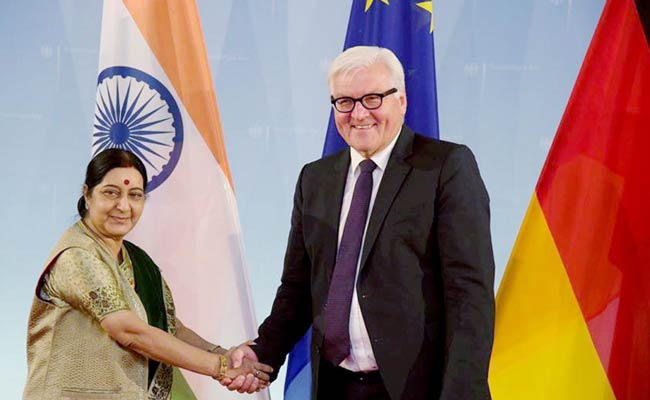
BERLIN: India and Germany today agreed to cooperate on counter-terrorism measures and reviewed proposals including a $1 billion German commitment for an ambitious solar venture in India, as they discussed deliverables during Chancellor Angela Merkel’s visit to the country.
In their wide-ranging talks, External Affairs Minister Sushma Swaraj and her German counterpart Frank-Walter Steinmeir assessed implementation of decisions taken during Prime Minister Narendra Modi’s visit to Berlin during April and broadly identified possible substantive outcomes from Merkel’s visit to New Delhi in October.
Both Ms Swaraj and Mr Steinmeir underlined the need to have closer security and defence cooperation between India and Germany considering the threat of terrorism. They discussed regional issues including Indo-Pak relations and the situation in Afghanistan.
“The meeting was very warm and very positive meeting which will further strengthen the India-Germany strategic partnership. And lead to a very fruitful and substantive outcome during Chancellor Merkel’s visit which is eagerly anticipated in India,” External Affairs Ministry Spokesperson Vikas Swarup told PTI in Berlin.
Mr Swarup said Ms Swaraj and Mr Steinmeir discussed specific proposals including a $1 billion financial commitment by Germany for a “very ambitious solar rooftop project”, its participation in projects like high speed railway corridors, raising speed of existing trains, Ganga rejuvenation initiative, smart cities project and skill development schemes.
He said both the leaders agreed to cooperate in cyber security and counter-terrorism measures besides underlining the need to go for co-production in the defence sector.
Chancellor Merkel is scheduled to visit India in the first half of October for Inter-Governmental Consultations which will be a summit meeting between Prime Minister Narendra Modi and her. She will be accompanied by a high-level delegation comprising a number of ministers, government officials and top executives of a number of leading German companies.
Mr Swarup said a whole range of issues were discussed in the one-on-one meeting as well as delegation level talks between the two foreign ministers.
“Basically the conversation continued from where the last time the Prime Minister and Chancellor Merkel had met here,” he said.
Asked whether the issue of threat of terrorism figured in the meeting, Swarup said it was discussed as it is a major challenge for both the countries and the idea was to step up security cooperation on a whole range of issues.
In the meeting, both sides agreed to arrive at a resolution of the sticky German language issue and an announcement about it is likely during Ms Merkel’s visit to India.
The meeting also focussed on ramping up trade ties, particularly to improve German investment.
Sources said the Indian side has made three proposals for Germany’s participation in the railways sector which include conducting feasibility studies for high speed corridors and raising speed of existing trains.
There may also be an announcement about Germany’s participation in skill development initiatives in India during Ms Merkel’s visit.
Germany is India’s largest trading partner in the EU and one of the top ten global trading partners. The overall exchange of goods and services between the two countries was valued at around around 15.96 billion euros last year, a drop of 1.14 billion euros from the level of 16.10 billion euros registered in 2013.
“The External Affairs Minister and German Foreign Minister reviewed the issues that were discussed when the Prime Minister had come here in April and what all have been implemented already. They took stock of that and also looked what more needs to be done,” Mr Swarup said.
Asked whether the issue of free trade agreement between India and European Union figured in Ms Swaraj’s meeting with Mr Steinmeier, Mr Swarup replied in negative.
Sushma Swaraj, who arrived in Berlin on a two-day visit last evening, earlier met President of German Lower House Nobert Lammert and Chairman of the Committee of Foreign Affairs of the Lower House Nobert Roetgen.
Both Mr Lammert and Mr Roetgen favoured deepening of ties between the two countries.